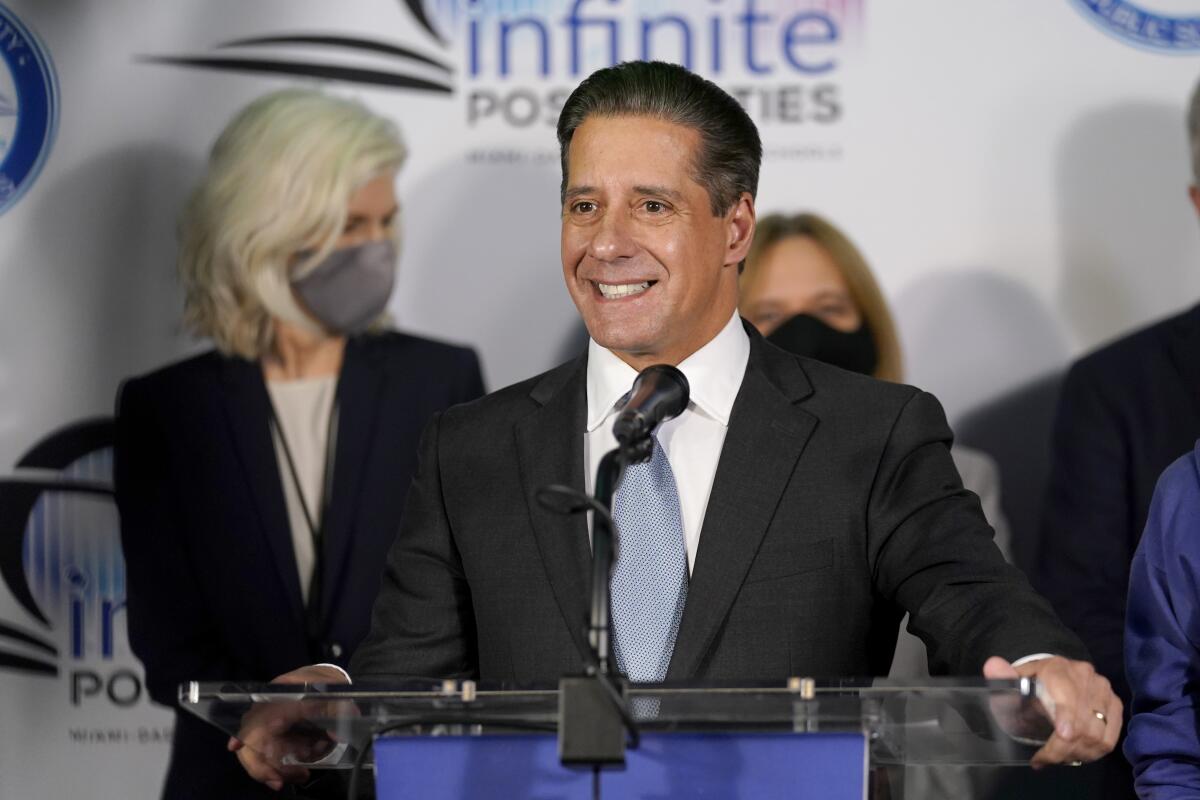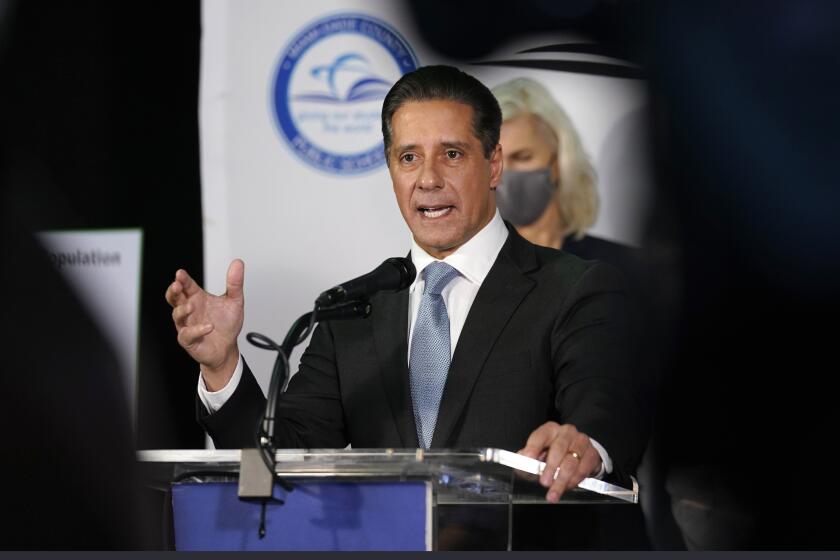L.A.’s new schools chief Alberto Carvalho impressed many in Miami. Can he transform L.A.?

- Share via
Alberto Carvalho, who has led Miami-Dade County Public Schools since 2008 and is among the nation’s most experienced and admired school district leaders, was named Thursday the next superintendent of the Los Angeles Unified School District, bringing a reputation for stability and improved student achievement in Florida to the nation’s second-largest school district.
The Los Angeles Board of Education unanimously approved his selection Thursday morning, a high-stakes decision at a pivotal moment for the school district, which is undertaking a monumental pandemic recovery effort for its 450,000 students.
In coming to L.A. Unified, Carvalho, 57, moves from heading the fourth-largest K-12 public school system to take on one of the highest-profile and most challenging posts in public education.
He’ll jump into a school system in which many students have long struggled to achieve and were further set back — academically and emotionally — by the COVID-19 pandemic. The district also is facing sharply declining enrollment and a long-term structural deficit. The financial risk has receded, for now, because of billions of dollars in coronavirus relief aid and state tax surpluses that Carvalho must spend quickly and wisely.
In remarks broadcast in Miami, Carvalho said long-standing challenges confront urban and rural school districts throughout the country.
“There are still historic, difficult achievement gaps between poor students and non-poor students,” he said. He also spoke of “unprecedented learning loss and unfinished learning as a result of this pandemic that has disproportionately impacted the most fragile amongst us — students of color, students who are poor English-language learners, and students with disabilities.”
“Based on the conversations that I’ve had with the leadership of the board in L.A., recognizing the challenges, the needs, but also the opportunities, I feel that this is a very good fit,” he said.
School board President Kelly Gonez agrees.
“Alberto Carvalho brings the deep experience we need as an educator and leader of a large urban district to manage L.A. Unified’s ongoing response to and recovery from the COVID-19 pandemic,” Gonez said. “He established a clear record of positive student outcomes and has relentlessly worked toward greater equity for historically underserved communities. I know he will continue that focus in Los Angeles.”
The board hopes to approve his contract next week. No start date was announced.
The record in Miami
In Miami, Carvalho’s accomplishments have included enhancing science and technology opportunities at schools and increasing the number of Advanced Placement and honors classes for minority students from low-income families, UCLA education professor Tyrone Howard said.
More broadly speaking, Carvalho seized on the importance of offering choices in schooling that embodied variety, quality and academic rigor, his supporters said.
The challenges in L.A. have relevant overlap, Howard added.
Miami-Dade school board member Lucia Baez-Geller praised Carvalho as data-driven, skilled at integrating technology and someone “willing to take steps that might not be popular but are necessary.”
On Florida’s accountability system, the Miami-Dade district’s rating has risen to an A.
One of Carvalho’s accomplishments has been surviving in the job for more than an entire generation of K-12 students. The tenure of urban superintendents typically lasts three years or less.
Since Roy Romer’s departure in 2006, L.A. Unified has had eight school chiefs, including interim office holders. Former Supt. Austin Beutner stepped down in June at the end of his three-year contract, in part citing exhaustion after managing through a teachers’ strike and a pandemic. Beutner’s top deputy, Megan Reilly, has served as interim leader since that time and was a finalist for the job.
A cross-country move
The new position will represent a full reboot for Carvalho, who has spent his entire education career affiliated with the Miami district — rising from teacher to the top job.
“He won’t have the benefit of the relationships in L.A. that he had in Miami,” said former Miami and New York City schools chief Rudy Crew, for whom Carvalho worked as a top aide in Miami. “He’ll have to work hard to do that. And I expect he will work hard to do that.”
Pedro Noguera, dean of USC’s Rossier School of Education, said Carvalho will be well served by his experience in the highly politicized environment of Miami and Florida.
In addition, “he is an innovator with an ability to ‘see’ a large system in all of its complexity,” Noguera said. All the same, “he will need to surround himself with people who know L.A. and know the current school system so that he can approach changing it strategically.”
Alberto Carvalho has led Miami-Dade County Public Schools, the nation’s fourth-largest district, since 2008.
In enticing Carvalho to change coasts, the Los Angeles Board of Education accomplished something that New York City — the nation’s largest school system — could not. In 2018, Carvalho agreed to take the New York job, then backed out one day later on live TV, announcing his decision to stay in Miami.
This time, he again appeared on live TV in Miami, but announced his departure.
“I want to demonstrate the possibilities of reinventing education, as we’ve done here in Miami-Dade in collaboration with good working people, the true believers, who right now labor and endeavor in teaching kids every single day in Los Angeles,” said Carvalho, who bear-hugged each dignitary who stood behind him.
A few local leaders and advocates had hoped a Latino would be appointed to serve a district that is nearly 75% Latino and about 10% white. Carvalho is a native of Portugal and speaks fluent Spanish, which he incorporated into his farewell remarks.
“Here we have another white man brought in to lead as superintendent, a white man immigrant from Europe,” said one L.A. advocate, who requested anonymity because she’ll have to collaborate with the new leader. “What is the cultural fit in L.A.?”
L.A. board member Nick Melvoin seemed to anticipate that concern in his praise for Carvalho: “We have no doubt that he will continue to lead with empathy, bringing his personal history as an immigrant and English learner to bear, and work alongside parents, students, teachers and the broader community to realize a vision of success for all students.”
Miami-Dade school board member Luisa Santos called Carvalho’s hire “a win for all immigrants, for all formerly undocumented people, for all English-language learners, to see people of that background in positions of power where they get to drive change for others,” she said.
Immigrant roots
Carvalho arrived alone and almost penniless to the U.S. at age 17. He learned English as a young adult and quickly worked his way up from construction and restaurant jobs as he attended Broward Community College. He later won a scholarship to Barry University and enrolled on a pre-med track. He excelled academically, but took a hard turn in his career path when, in his mid-20s, he interviewed for a teaching position at Miami Jackson Senior High. He was offered a job the same day, a Miami Herald profile reported in 2019.
After four years in the classroom — teaching physics, chemistry and calculus — he became an assistant principal. The superintendent at the time was so impressed that he brought Carvalho to work downtown without his having been a principal. Carvalho oversaw federal programs and later became the district’s chief communications officer. He gained further experience by overseeing grant administration and lobbying state officials.
Under Supt. Crew, Carvalho launched several initiatives, including a Parent Academy and a School Improvement Zone, focusing on campuses with low academic achievement.
After becoming superintendent, Carvalho eventually filled a gap in his resume, serving as a principal. He put himself at the helm of a new campus called iPrep Academy, a pre-kindergarten-to-12th-grade magnet school “designed to promote respect and responsibility among the students and staff,” according to its website. All students are required to take honors classes.
A few stumbles
His career also included episodes that led to criticism.
In Miami, Carvahlo’s tenure as superintendent was marred at the beginning when embarrassing emails surfaced between him and an education beat reporter. A few emails were romantically suggestive; others indicated what some perceived as professionally inappropriate collaboration on coverage. The reporter, who had moved on to another newspaper, resigned from her job, but Carvalho — who denied any romantic involvement — forged ahead.
Carvalho came under scrutiny late last year from the school system’s inspector general. Carvalho had helped solicit a $1.57-million donation from an online instruction company for a foundation that Carvalho oversees. The company had a contract pending with the district. Once hired, the company provided an online platform that was mired in problems and quickly scrapped, the Miami-Herald reported.
In June, the inspector general concluded that the donation, which was meant to benefit teachers, did not violate state or district ethics policies, but created “the appearance of impropriety” and that the foundation, which Carvalho had started, should return the funds. The foundation instead distributed the money in $100 gift certificates to teachers, according to the Miami Herald.
In the big picture, such episodes were “the most minor of speed bumps on a very smooth and very successful 14-year run,” said Fernand Amandi, a local communications strategist based in Miami.
Los Angeles educators and advocates generally expressed enthusiasm over the selection.
“Importantly, he views English learners not primarily as students who lack English fluency but as the children of immigrants with the rich hopes, dreams and aspirations that immigrant families have always brought to this country,” said Patricia Gandara, a professor of education at UCLA and an expert on English learners, who make up nearly 20% of L.A. district students.
Eighth-grade English teacher Joni Badar also was hopeful.
“As an educator, I am thrilled to have a leader who has served in the classroom and as a principal appointed to head our district,” said Badar, who teaches at White Middle School in Carson. “It is essential that our new superintendent listens to and works alongside teachers.”
More to Read
Sign up for Essential California
The most important California stories and recommendations in your inbox every morning.
You may occasionally receive promotional content from the Los Angeles Times.














